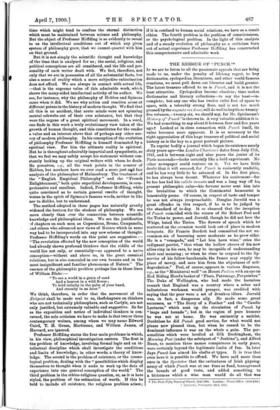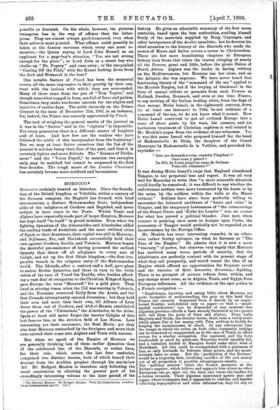THE REISSUE OF "PUNCH."*
IF we are to listen to all the passionate appeals that are being made to us, under the penalty of lifelong regret, to buy dictionaries, cyclopkedias, literatures, and other world-famous creations, we must pull down our libraries and build greater. The latest treasure offered to us is Punch, and it is not the least attractive. Cyclopmdias become obsolete ; time makes dictionaries and literary collections—to say the least—in- complete; but any one who has twelve cubic feet of space to spare, with a tolerably strong floor, and is not too much pressed by the angusta res donai, will do well to buy these twenty- five volumes,—twenty-six, we should say, for Mr. Spielmann's History of ' Punch.' is thrown. in. A very valuable addition it is. We had something to say about it between four and five years ago.i- Looked at in close connection with Peach itself, its value becomes more apparent. It is as necessary to the right appreciation of this huge treasure of political and social history as is the key to a great portrait picture.
To reprint bodily a journal which began its existence nearly sixty years ago—the London Charivari dates from Jaly 17th, 1841, and is between eight and nine years the junior of its Paris namesake—looks certainly like a bold experiment. No other newspaper could venture on it. Yet we have little doubt that it will succeed, for Punch is eminently readable, and he has very little to be ashamed of. In the first place, he has always been decent. Whatever his excitement—for he too has had his calkla iuventa and was a long way off his present philosophic calm—his fervour never sent him into the brutalities to which the Continental humourist is lamentably prone. Of course, in respect of taste and temper he was not always irreproachable. Douglas Jerrold was a great offender in this respect, if he is to be judged by the standard of to-day. It so chanced that the inception of Punch coincided with the return of Sir Robert Peel and the Tories to power, and Jerrold, though he did not love the Whigs, hated the Tories. The flowers of speech which he scattered on the occasion would look out of place iu modern bouquets. Sir Francis Burdett had committed the not un- common sin of becoming more moderate as he grew older. He is a "renegade," and " Let him have wine," cries the indignant patriot, " that when the hollow cheers of his new allies ring in his ears, be may be incapable of understanding their real meaning ; or when he rises to respond to the lip- service of his fellow-bacchanals, the fumes may supply the place of mercy, and save him from the abjectness of self- degradation." Peel, of course, appears in various disguises, e.g., as the "Ministerial wolf "on Mount Peclion with an eye on Red Riding Hood's basket of "Place, Patronage, Perquisites." The Duke of Wellington, who had made the harmless remark that England was a country where a sober and industrious workman would prosper, was credited with saying that the poor were a set of drunken idlers. Jerrold was, in fact, a dangerous ally. He made some great successes, as " The Story of a Feather " and the " Candle Lectures," which sent up the circulation of Punch. by "leaps and bounds "; but in the region of pure humour he was not at home. He was eminently a satirist. Doubtless he did Punch good service, for what would not please now pleased then, but when he ceased to be the dominant influence it was on the whole a gain. The per- sonalities which were levelled at Silk Buckingham, the Morning Post (under the sobriquet of " Jenkins"), and Alfred Bunn, to mention three names conspicuous in early years, were certainly beyond the legitimate limits of fun. In later days Punch has aimed his shafts at types. It is true that even here it is possible to offend. We have said more than once in the Spectator that the caricatures of Irish physiog- nomy of which Punch was at one time so fond, transgressed the bounds of good taste, and added something to a bitterness which a wise man would do all that was • The First Fifty Years of Punch, 1841-1891. London : Timea Office. f£19-£30.] -} Spectator, November 23rd, 1899.
possible to diminish. On the whole, however, the pictures transgress less in the way of offence than the letter- press. They are almost always good-humoured, even when their satire is most pointed. What offence could possibly be taken at the famous cartoons which every one must re- member,—the Queen saying to Lord John Russell as an applicant for a page-boy's situation, " You are not strong enough for the place "; or Lord John as a street boy who chalks up "No Popery" and runs away; or the unequalled " Casting Off the Pilot," with the Kaiser looking down from the deck and Bismarck in the boat P
One notable feature of Punch has been the memorial verses, all the more impressive in their gravity by their con- trast with the levities with which they are surrounded. Many of these came from the pen of " Tom Taylor," and though somewhat rugged in form, are full of force and pathos. Sometimes they make handsome amends for the slights and injustice of earlier days. The noble threnody on the Prince Consort in the issue of December 21st, 1861, is an instance, for, indeed, the Prince was scarcely appreciated by Punch.
The task of weighing the general merits of the journal as it was in the " forties " and in the " eighties " is impossible. For every generation there is a different source of laughter and of tears. And how few are the readers who have followed the mirth of this merrymaker from the beginning ! But we may at least flatter ourselves that the fun of the present is not less funny than that of the past, and that it is certainly lighter and more delicate. The " Essence of Parlia- ment" and the "Votes Populi," to mention two examples only, may be matched but cannot be surpassed in the first four decades. The rough music of the London Charivari has certainly become more subdued and harmonious.







































 Previous page
Previous page